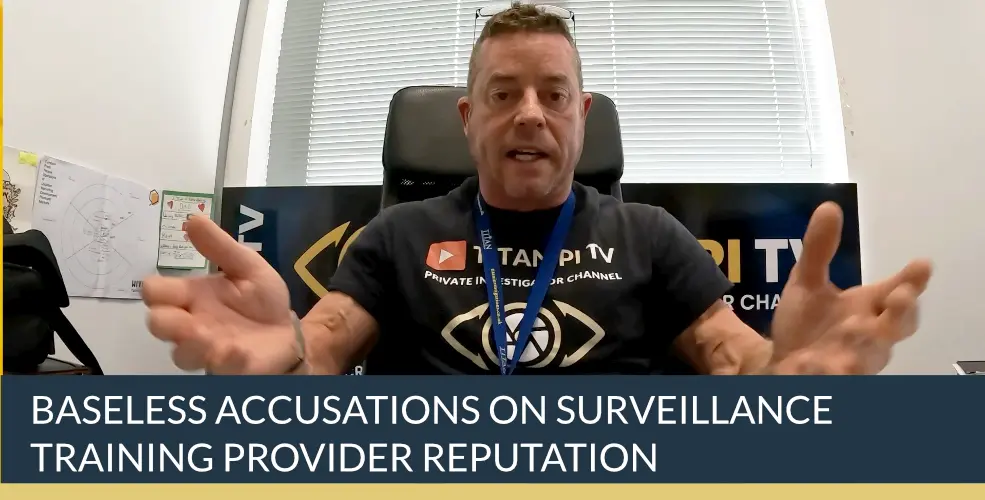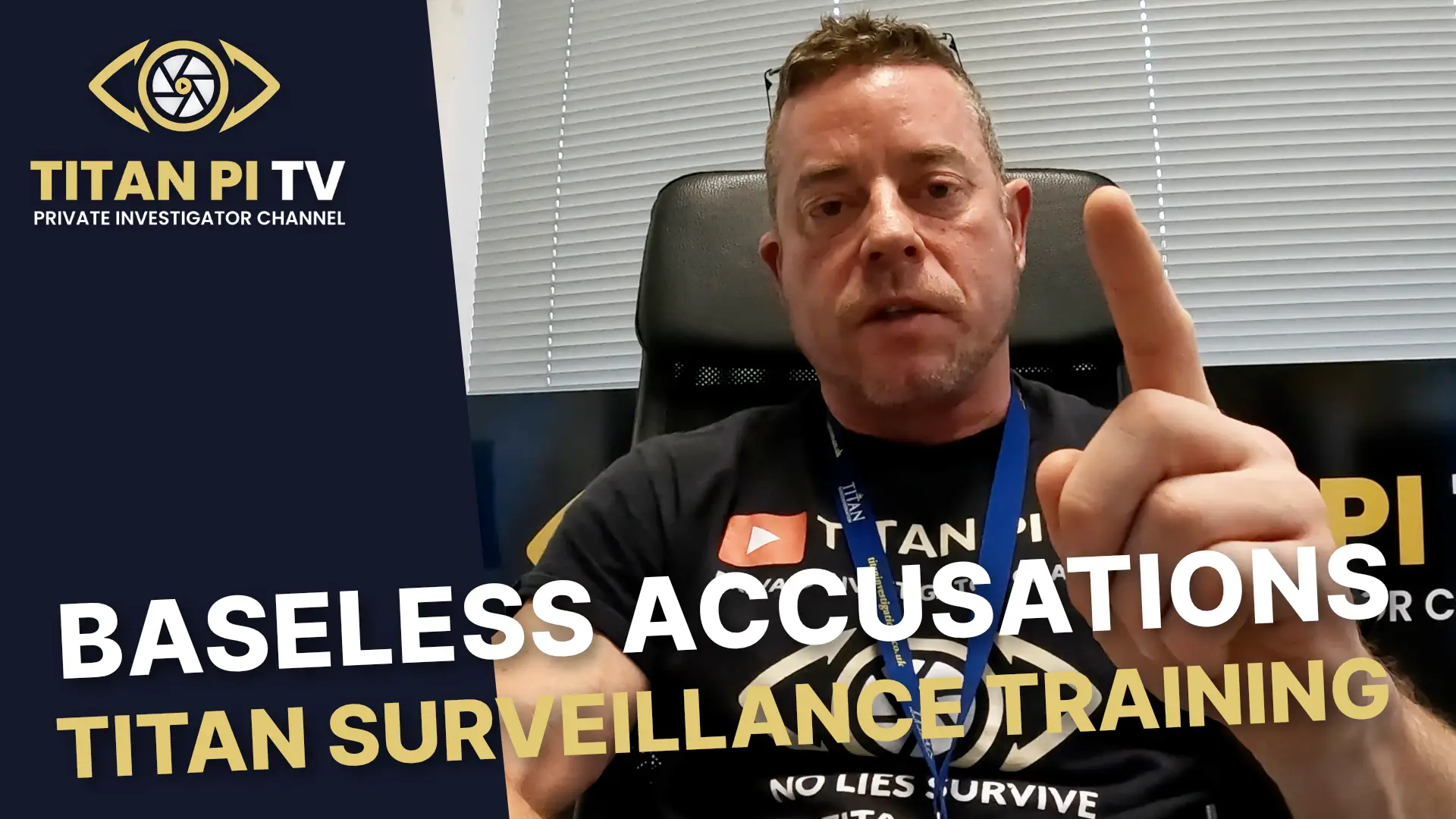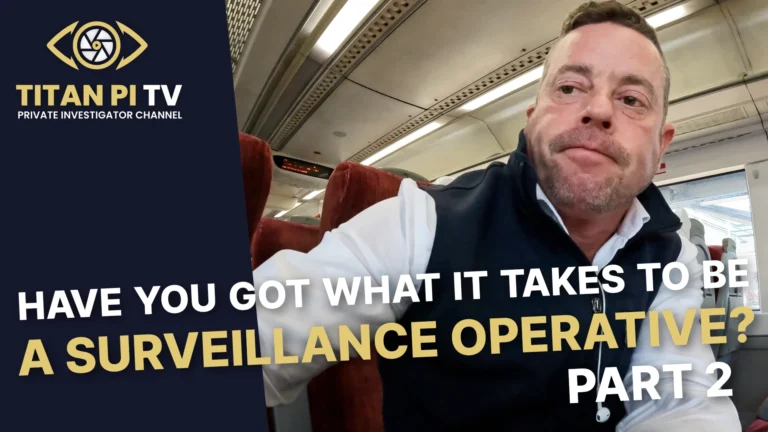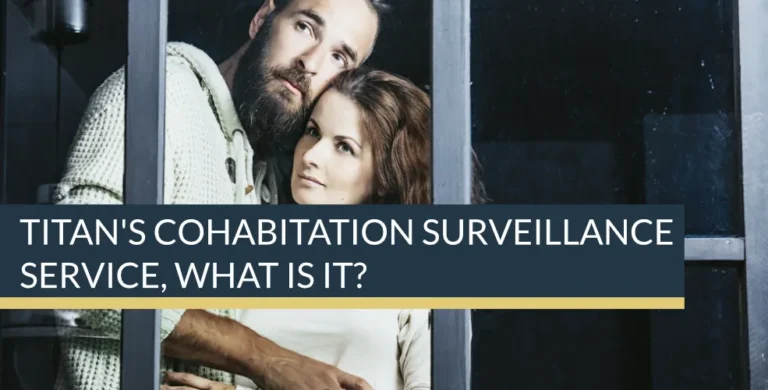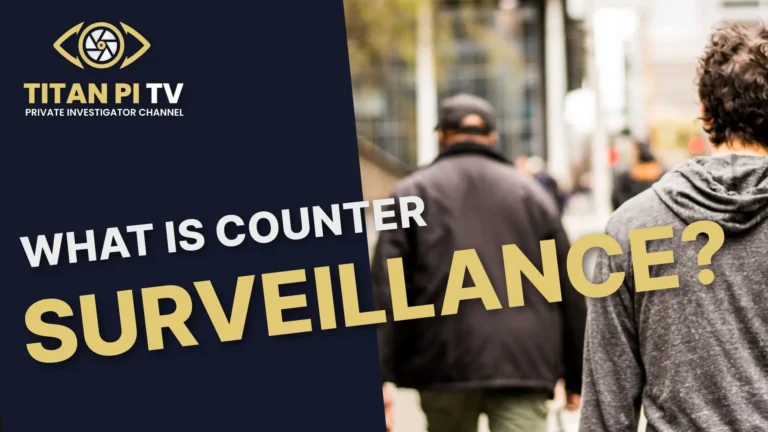Baseless Accusations on Surveillance Training Provider Reputation
The devastating impact that baseless accusations can have on Private Investigator Training Provider
One bad story from a single student can wipe out years of solid work in the private investigator training world. Imagine running top‑notch courses for eight years with zero complaints, only for one unhappy voice to spread doubt online and in chats. This piece looks at how that happened to Titan Private Investigations Ltd, a key player in UK surveillance training, and what it means for the whole industry.
Titan PI TV dives into the real side of investigation work. Host Simon Henson runs the company from Derby, with offices stretching from the South West to Manchester for full UK coverage. Since 2017, Titan has trained hundreds of aspiring investigators without issue, but one recent case shows how fragile trust can be in a niche, reputation‑driven profession where word of mouth moves faster than any formal review.
Eight Years of Proven Excellence Undermined by One Incident
Titan has built a strong name in private investigator training over eight years. The company runs four residential courses each year—in February, May, September, and November—designed to compress a steep learning curve into five intensive days of theory, simulation, and live scenario work. Hundreds of students have passed through, consistently praising the practical emphasis, the professionalism of instructors, and the clear line of sight from training into real operational work.
Until recently, no material complaints had ever surfaced. That is striking in a field where outcomes are measurable, evidence matters, and performance is continually scrutinised by courts, clients, and peers. Nonetheless, one false claim can still shake confidence quickly, especially when it is broadcast in closed professional groups where hearsay can masquerade as informed judgment.
The Titan PI Training Pathways and Accreditation
Titan offers two main progression routes to meet different learner goals.
- Titan Certificate of Achievement:
- Awarded to all students who complete the five‑day course and meet attendance and performance standards.
- Functions as proof of attendance and skills exposure.
- The certificate lists all 19 modules covered, providing prospective clients or employers with a transparent view of the curriculum.
- RQF Level 4 Qualification (above A‑level standard):
- Administered via the Institute of Professional Investigators (IPI), with Skills for Justice as the awarding body.
- Candidates pay the IPI administration fee and complete a dedicated post‑course assessment process.
- Two Titan trainers sit on the IPI board, contributing to sector standards and ensuring alignment between training and assessment without compromising independence. External quality assurance by Skills for Justice safeguards integrity and parity across providers.
The route is intentionally rigorous. Learners complete five days of classroom and practical training, followed by a 28‑day window to submit a structured workbook demonstrating understanding, legal compliance, and operational decision‑making. This system produces competent, deployment‑ready operators. In fact, it directly feeds Titan’s own operations team—standout students transition into paid assignments through Titan’s graduate pathways and grow‑on programme.

A Comprehensive Syllabus with a Steep, Managed Learning Curve
Titan’s five‑day course is a full‑on immersion. Training days typically start at 08:00 and run through to early evening, with some sessions closing around 19:00–20:00 to accommodate post‑exercise debriefs and legal consolidation. The structure balances cognitive load, contextual understanding, and muscle memory, with mornings focused on legal principles and tradecraft frameworks, and afternoons dedicated to live application in urban and transport environments.
Key elements include:
- Legal Foundations and Ethics: Surveillance law, reasonable expectation of privacy, necessity and proportionality, handling of personal data, and evidential continuity.
- Communications: Radio protocols, cellular comms discipline, concise reporting, and emergency procedures.
- Covert Persona and Cover Stories: Planning and using legends, behavioural blending, and contingency planning.
- Subject Identification and Behavioural Baselines: Pre‑task research, positive ID techniques, and dynamic baseline assessment.
- Foot Surveillance (ABC teams): Corner clearing, leapfrogging and handovers, snap decisions under pressure, and use of urban architecture for cover.
- Public Transport Surveillance: Platform discipline, carriage positioning, contact‑avoidance measures, and de‑boarding tactics.
- Anti‑Surveillance Awareness: Recognising hostile reconnaissance, dealing with burn signs, and conducting clean breaks.
- Mobile Surveillance: Rolling pickups, convoy discipline, urban and rural follow techniques, box and stop‑and‑plot drills.
- Evidential Capture: Video and stills standards, angle and context, continuity statements, and admissibility considerations.
- Loss Recovery: On foot and mobile re‑acquisition strategies, map overlays, and comms‑led re‑joins.
- Static Observations: Site selection, ingress/egress, overwatch techniques, and logging.
- Technology Modules: GPS trackers in lawful contexts, RF awareness, optics, and body‑worn video best practice.
- Reporting: Note‑taking, contemporaneous logs, time synchronisation, and structuring client‑facing and court‑facing reports.
Students complete 15–17 hours of pre‑course e‑learning to land on day one with baseline legal and theoretical knowledge. This allows the instructors to maximise time on live drills and complex scenarios, raising the standard quickly and consistently while ensuring learners understand the “why” behind every “how”.
Case Study: Feedback Disparity Following the September Course
On 15–19 September, 12 students attended: four elected to pursue the RQF Level 4 pathway; eight completed the Titan Certificate route. End‑of‑course feedback was broadly positive—participants praised the intensity, realism, and hands‑on focus. Instructors noted healthy team dynamics, good progression, and solid competence under time pressure.
However, within days, one individual’s stance shifted dramatically, diverging from the otherwise consistent sentiment of the cohort. The change wasn’t simply a difference in taste or style; it presented as a wholesale rejection of the course’s value proposition despite contemporaneous signs of engagement and understanding during delivery.
The Abrupt Shift: Refund Request and Public Accusations
On 24 September—five days after completion—an email arrived from one student. It began with a routine query about the certificate date, but pivoted sharply into a demand for a full refund of £1,440 (incl. VAT), citing “no value” and claiming a different, ex‑military‑run provider would have been superior. Simon Henson phoned to verify the concerns in good faith and invited specific detail, offering to consider a partial solution where justified.
The grievances listed were:
- Course portal content was missing at the outset.
- Trainers “read from tablets” and appeared inexperienced.
- The attendance certificate was “barbaric” and unfit for job applications.
- Raising issues felt unwelcome or “silly”.
- The student gained “no skills”.
Notably, the student had enrolled only a week before commencement—compressing the pre‑course study time—and still completed the online modules.
Countering the Claims with Operational Reality and External Oversight
Each allegation was straightforward to verify against records and process controls:
- Portal Access and Timing:
- Access was provisioned and functioning; a content cache refreshed within approximately 12 hours.
- Logs confirm the student completed the required e‑learning modules before attending.
- Instructor Professionalism:
- Titan’s instructors do not read from tablets; a laptop is used to run slides to a classroom screen.
- Staff backgrounds include military and live surveillance operations, with training delivery experience measured in years.
- Lesson plans, risk assessments, and scenario packs are standardised and audited.
- Certificate Format and Purpose:
- The Titan Certificate is designed as proof of course completion and a skills overview, not as an academic credential.
- The RQF Level 4 route provides the formal qualification through IPI and Skills for Justice if a learner opts in and completes the assessment workbook.
- Learner Voice and Culture:
- The course encourages challenge, questions, and structured debriefs; peer critiques are normalised to model real‑world post‑op reviews.
- There was no contemporaneous record of intimidation, isolation, or barriers to raising concerns.
- Evidence of “No Skills Gained”:
- Practical exercise logs, instructor observation notes, and end‑of‑course assessments indicated progression.
- A Skills for Justice external assessor observed the same September run and confirmed that delivery met the required standards.
The gulf between the student’s post‑hoc claims and the documented reality suggested external influence or motivation. In small sectors like investigations and close protection, rivalry and recommendation loops are common. All reputable providers operate within the same accreditation standards for the RQF, and competitive advantage typically comes from instruction quality, operational credibility, and post‑training opportunities—not from cutting corners.
The Ripple Effect: How One Voice Can Outpace Evidence
One voice can echo loudly in tight‑knit communities. The student proceeded to post strong criticism in a Close Protection Operatives WhatsApp group, claiming to have learned nothing and advising against Titan. Meanwhile, the other 11 attendees expressed satisfaction, with a significant proportion already engaged in real work for Titan and partner firms. Nonetheless, digital word‑of‑mouth can spread faster than corrections; nuance and context are often lost, and audiences rarely see the underlying documents, logs, or third‑party assurances.
For training businesses, the damage isn’t limited to one cohort. It depresses future sign‑ups, casts doubt in employer circles, and forces providers to divert energy into rebuttal and reassurance rather than innovation and delivery. In short, baseless claims are never “just one message”—they create friction across the funnel, from marketing to placement.
Identifying and Managing High‑Risk Individuals in Training
Vetting is a necessary safeguard, but it’s not a mind‑reader. Titan screens for appropriate backgrounds and legality; personality fit emerges in real time. In this case, no pre‑course flags were raised. Post‑course, further checks revealed a pattern of instability in the candidate’s CP work history—walking off jobs, being released early, and difficulty embedding within teams.
Surveillance work rewards patience, composure, clarity under stress, and unglamorous attention to detail. It is closer to disciplined craft than to cinematic action. Some individuals, however skilled in other security domains, find this cadence frustrating. The student in question did not meet Titan’s post‑course suitability thresholds and was therefore not considered for live tasking.
The lesson is not to shut the door on unconventional candidates, but to recognise the early signs of misalignment:
- Impatience with methodical process.
- Discomfort with being observed, critiqued, or coached.
- Preference for confrontation over collaboration.
- Low tolerance for ambiguity or “quiet” operational time.
Training providers can mitigate risk by being explicit about the demands and culture of surveillance from marketing onwards, using pre‑course self‑assessments, and creating safe but honest feedback loops during delivery. Clear expectations reduce shock, disappointment, and post‑hoc rationalisations.
Protecting Your Training Business Against Unfounded Attacks
There is a practical playbook that responsible providers should adopt:
- Document Everything:
- Maintain attendance logs, assessment rubrics, instructor observations, risk assessments, and incident reports.
- Preserve comms about portal access, login timestamps, and module completion.
- Archive external assessor reports and internal QA reviews.
- Engage Early, Professionally, and Proportionately:
- Verify the complaint, invite specifics, and acknowledge genuine inconvenience (e.g., a delayed content refresh) while clarifying its material impact.
- Offer reasonable remedies when warranted—partial refunds or re‑attendance options can be fair where service gaps are proven.
- Avoid knee‑jerk defensiveness; facts speak best when calmly presented.
- Leverage Independent Oversight:
- Reference accreditation frameworks, awarding body audits, and external observations.
- Where possible, publish anonymised quality metrics and satisfaction scores.
- Tell Your Story at Scale:
- Use podcasts, YouTube (Titan PI TV), blogs, and case studies to highlight genuine student outcomes and operational placements.
- Encourage alumni testimonials and employer references to act as a reputational buffer.
- Set Clear Terms Upfront:
- Specify what the course does and does not guarantee (no implied job guarantees).
- Explain the difference between attendance certificates and formal qualifications.
- Outline complaints and refund procedures transparently.
- Safeguard Your Team:
- Provide staff with training in conflict de‑escalation and complaint handling.
- Ensure instructors know when to escalate to management and when to disengage.
Done well, these measures don’t merely defend reputation—they enhance it by demonstrating maturity, traceability, and respect for learners and clients alike.
Maintaining Momentum Despite Setbacks
Titan has pressed on. The 17–21 November course is already well populated, with three full teams configured to ensure effective rotation through foot surveillance drills, public transport scenarios, and mobile follow exercises. Instructor‑led walk‑throughs and hot debriefs translate classroom concepts into field readiness.
The 2026 schedule will maintain the quarterly cadence: February, May, September, and November. Dates are published in advance to support employer planning and individual CPD pathways. Graduates continue to enter Titan’s grow‑on programme, which focuses on real assignments, mentored development, and steady skill consolidation—the bridge between competence and confidence.
For prospective learners, recent Titan PI TV episodes give a window into the teaching style and scenario content, including clips from the September course. Seeing the method and pace in action helps prospective students self‑select into a learning environment that is demanding but fair, structured but realistic.
Industry Context: Why This Matters Beyond Titan
The UK investigations sector is maturing. Clients expect lawful, evidentially sound output; courts expect continuity, clarity, and candour. Training providers sit at the front of that pipeline. When reputations are attacked without foundation, the damage isn’t merely commercial—it risks pushing learners towards less rigorous provision, eroding standards across the board.
Three broader implications stand out:
- Standards First: Independent accreditation and external quality assurance are non‑negotiables in sensitive disciplines. Providers should invest in them and make them visible.
- Culture of Evidence: The sector must model what it teaches—facts over noise, records over rhetoric, proportionality over performance.
- Community Responsibility: Closed‑group chatter has real‑world effects. Leaders and influencers in CP and investigations should temper commentary with fairness, encouraging criticism that is specific, evidenced, and solution‑oriented.
Practical Guidance for Prospective Students
Choosing a surveillance course? Consider:
- Accreditation Path: Does the course map to a recognised RQF qualification? Who is the awarding body? What independent oversight exists?
- Curriculum Breadth: Are legal, practical, and reporting modules covered in depth? How much time is spent on live scenarios?
- Instructor Credibility: Are trainers active or recent operators? Do they publish doctrine, case studies, or teaching artefacts you can examine?
- Work Pathways: Is there a genuine route to paid assignments for those who excel? Ask for alumni outcomes.
- Transparency: Are terms, assessment requirements, and complaints processes clear upfront?
Make no mistake—surveillance is demanding. The best courses won’t make it “easy”; they’ll make it achievable through structure, repetition, and honest feedback. That is the point.
Conclusion: Commitment to Quality Training and Future Operators
Baseless accusations sting, but solid work wins out. Titan’s eight‑year record shows that one discordant voice does not define an institution. Systems are in place to catch technical hiccups; external oversight validates quality; and a steady flow of graduates moving into paid work speaks louder than anonymous posts.
The lessons are clear. Vet smartly, set expectations honestly, document rigorously, and engage complaints with professionalism. Above all, keep delivering. In this trade, proof is cumulative, and credibility compounds with every successful operation.
If you are ready to step into surveillance the right way—legally, ethically, and operationally—visit the Titan website at www.titaninvestigations.co.uk. Navigate to the Training section and explore the five‑day Surveillance Training course. It compresses advanced content into a structured programme, with two specialised modules held back for later progression (including potential night operations in November, subject to course structure). Pre‑course online learning will get you primed; the residential week will put you through your paces; the post‑course options will help you convert learning into work.
Sign up, prepare properly, and hit the ground running. Titan is building operators who last—measured not by the loudest voices online, but by the quiet, consistent delivery of lawful, evidential results in the real world.
About Titan Private Investigation Ltd
Titan Private Investigation Ltd is a leading provider of corporate and private investigation services in the UK. Based in Derby, the company serves clients nationwide, offering a full range of investigative solutions including surveillance, fraud investigation, digital forensics, and more. We are a private investigation agency with a reputation for professionalism, discretion, and delivering results. Titan is the trusted partner of choice for businesses seeking to protect their interests and ensure compliance.
London Surveillance Operative Training – Call the Titan Investigations London Office 020 39046622
Birmingham SSurveillance Operative Training – Call the Titan Investigations Birmingham Office 0121 7162442
Cambridge Surveillance Operative Training – Call the Titan Investigations Cambridge Office 01223 662022
Derby Surveillance Operative Training – Call the Titan Investigations Derby (Head Office) 01332 504256
Leeds Surveillance Operative Training – Call the Titan Investigations Leeds Office 0113 4574066
Leicester Surveillance Operative Training – Call the Titan Investigations Leicester Office 0116 2436520
Nottingham Surveillance Operative Training – Call the Titan Investigations Nottingham Office 0115 9646950
Manchester Surveillance Operative Training – Call the Titan Investigations Manchester Office 0161 3023008
Sheffield Surveillance Operative Training – Call the Titan Investigations Sheffield Office 0114 3499400
Truro Surveillance Operative Training – Call the Titan Investigations Truro Office 01872 888706
Alternatively, you can contact us directly using our fully confidential contact form at enquiries@titaninvestigations.co.uk or chat directly using our Live Chat facility, and one of our UK Private Investigators will get right back to you.

